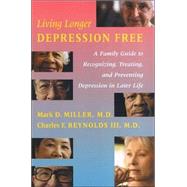
Mark D. Miller, M.D., is an associate professor of psychiatry at the University of Pittsburgh School of Medicine and medical director of the Late-Life Depression Prevention Clinic at the Western Psychiatric Institute and Clinic. Charles F. Reynolds III, M.D., is a professor of psychiatry, neurology, and neuroscience at the University of Pittsburgh School of Medicine, where he is also director of the NIMH-funded Intervention Research Center for Late-Life Mood Disorders.
| Foreword | xi | ||||
|
|||||
| Preface | xv | ||||
| I UNDERSTANDING LATE-LIFE DEPRESSION | |||||
|
3 | (16) | |||
|
3 | (6) | |||
|
9 | (3) | |||
|
12 | (2) | |||
|
14 | (1) | |||
|
14 | (2) | |||
|
16 | (3) | |||
|
19 | (15) | |||
|
20 | (1) | |||
|
21 | (4) | |||
|
25 | (3) | |||
|
28 | (1) | |||
|
28 | (1) | |||
|
29 | (5) | |||
|
34 | (19) | |||
|
35 | (1) | |||
|
36 | (9) | |||
|
45 | (3) | |||
|
48 | (5) | |||
|
53 | (14) | |||
|
53 | (3) | |||
|
56 | (1) | |||
|
56 | (2) | |||
|
58 | (2) | |||
|
60 | (1) | |||
|
61 | (2) | |||
|
63 | (4) | |||
| II. Evaluating and Treating Depression | |||||
|
67 | (15) | |||
|
70 | (4) | |||
|
74 | (3) | |||
|
77 | (1) | |||
|
78 | (1) | |||
|
78 | (1) | |||
|
79 | (3) | |||
|
82 | (15) | |||
|
82 | (1) | |||
|
83 | (6) | |||
|
89 | (2) | |||
|
91 | (5) | |||
|
96 | (1) | |||
|
97 | (19) | |||
|
98 | (1) | |||
|
99 | (6) | |||
|
105 | (1) | |||
|
106 | (1) | |||
|
107 | (1) | |||
|
107 | (2) | |||
|
109 | (1) | |||
|
110 | (4) | |||
|
114 | (2) | |||
|
116 | (19) | |||
|
116 | (1) | |||
|
117 | (2) | |||
|
119 | (2) | |||
|
121 | (1) | |||
|
122 | (9) | |||
|
131 | (4) | |||
| III. Staying Free of Depression for the Long Term | |||||
|
135 | (19) | |||
|
138 | (1) | |||
|
139 | (1) | |||
|
140 | (4) | |||
|
144 | (2) | |||
|
146 | (2) | |||
|
148 | (2) | |||
|
150 | (1) | |||
|
151 | (3) | |||
|
154 | (5) | |||
|
154 | (2) | |||
|
156 | (1) | |||
|
157 | (2) | |||
| Appendix | 159 | (8) | |||
|
159 | (2) | |||
|
161 | (6) | |||
| References | 167 | (12) | |||
| Index | 179 |
The New copy of this book will include any supplemental materials advertised. Please check the title of the book to determine if it should include any access cards, study guides, lab manuals, CDs, etc.
The Used, Rental and eBook copies of this book are not guaranteed to include any supplemental materials. Typically, only the book itself is included. This is true even if the title states it includes any access cards, study guides, lab manuals, CDs, etc.